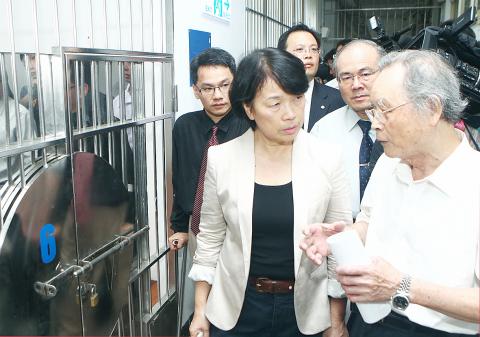The government is racing against time to preserve oral histories of survivors of the White Terror before they pass away, Minister of Culture Lung Ying-tai (龍應台) yesterday said at the Jingmei Human Rights Memorial and Cultural Park, where she met several former political prisoners, academics and human right activists and asked their advice on the National Human Rights Museum currently under preparation.
The planned museum includes a culture park in Jingmei, which once served as a military detention center where political dissidents were tried from the late 1960s to the 1980s, as well as a 32 hectare memorial park on Green Island (綠島) that was used to imprison prisoners of conscience.
A preparatory office was set up in December last year, and its current task is to collect, restore and manage documents and information relating to prisoners and victims from 1949, when martial law was declared in Taiwan until 1987, when it was lifted, government officials said.

Photo: Hu Shuan-shiang, Taipei Times
Former political prisoner Liu Chia-chin (劉佳欽) said that it was urgent to form a consultative committee so that different voices and suggestions could be heard and adopted by the museum. He also urged the government to focus its limited budget and resources on people and content rather than facilities.
To reach a larger number of people, former prisoner Chen Sung (陳松) suggested the museum recruit interested college and university students to do internships and volunteer work so that younger generations could learn about the nation’s past.
On the issue of oral history preservation, human rights activist Chen Ming-cheng (陳銘城) said that there was not enough time for museum staff to conduct one-on-one interviews with survivors, most of whom are in their 70s and 80s.
“We can do a lot more if local governments team up with local cultural and historical societies, as well as victim groups, to do the job,” Chen Ming-cheng said.
Academia Sinica research fellow Wu Nai-teh (吳乃德) echoed Chen Ming-cheng’s view, adding that it takes time to build trust between the government and victims’ families.
“It is difficult for the families to trust the government that once oppressed them. Donating personal objects and documents are just the beginning. The next step is to let the families know how their donations will be preserved, displayed and used. It’s another main task of the museum,” Wu said.
The researcher also said the National Archives should make public the classified files relating to political cases during the White Terror era. The access to original files has been limited even to family members seeking to understand what happened, Wu added.
Lung promised to negotiate with the National Archives on the matter, saying she was stunned when first learning that even now “it is difficult for family members to obtain letters left by their loved ones before they died.”
At yesterday’s meeting with Lung, Chen Meng-ho (陳孟和), who was jailed at Green Island’s New Life Correction Center for 15 years, donated an oil painting depicting what the island looked like during the White Terror era to the museum and invited Lung to pay a visit to Green Island, not as “an governmental official,” but as “a cultural worker.”
During his imprisonment, Cheng Meng-ho took photographs and created a number of sketches and drawings that were later used by the now-defunct Council for Cultural Affairs to reconstruct the prison.

Alain Robert, known as the "French Spider-Man," praised Alex Honnold as exceptionally well-prepared after the US climber completed a free solo ascent of Taipei 101 yesterday. Robert said Honnold's ascent of the 508m-tall skyscraper in just more than one-and-a-half hours without using safety ropes or equipment was a remarkable achievement. "This is my life," he said in an interview conducted in French, adding that he liked the feeling of being "on the edge of danger." The 63-year-old Frenchman climbed Taipei 101 using ropes in December 2004, taking about four hours to reach the top. On a one-to-10 scale of difficulty, Robert said Taipei 101

Nipah virus infection is to be officially listed as a category 5 notifiable infectious disease in Taiwan in March, while clinical treatment guidelines are being formulated, the Centers for Disease Control (CDC) said yesterday. With Nipah infections being reported in other countries and considering its relatively high fatality rate, the centers on Jan. 16 announced that it would be listed as a notifiable infectious disease to bolster the nation’s systematic early warning system and increase public awareness, the CDC said. Bangladesh reported four fatal cases last year in separate districts, with three linked to raw date palm sap consumption, CDC Epidemic Intelligence

Two Taiwanese prosecutors were questioned by Chinese security personnel at their hotel during a trip to China’s Henan Province this month, the Mainland Affairs Council (MAC) said yesterday. The officers had personal information on the prosecutors, including “when they were assigned to their posts, their work locations and job titles,” MAC Deputy Minister and spokesman Liang Wen-chieh (梁文傑) said. On top of asking about their agencies and positions, the officers also questioned the prosecutors about the Cross-Strait Joint Crime-Fighting and Judicial Mutual Assistance Agreement, a pact that serves as the framework for Taiwan-China cooperation on combating crime and providing judicial assistance, Liang

US climber Alex Honnold left Taiwan this morning a day after completing a free-solo ascent of Taipei 101, a feat that drew cheers from onlookers and gained widespread international attention. Honnold yesterday scaled the 101-story skyscraper without a rope or safety harness. The climb — the highest urban free-solo ascent ever attempted — took just more than 90 minutes and was streamed live on Netflix. It was covered by major international news outlets including CNN, the New York Times, the Guardian and the Wall Street Journal. As Honnold prepared to leave Taiwan today, he attracted a crowd when he and his wife, Sanni,